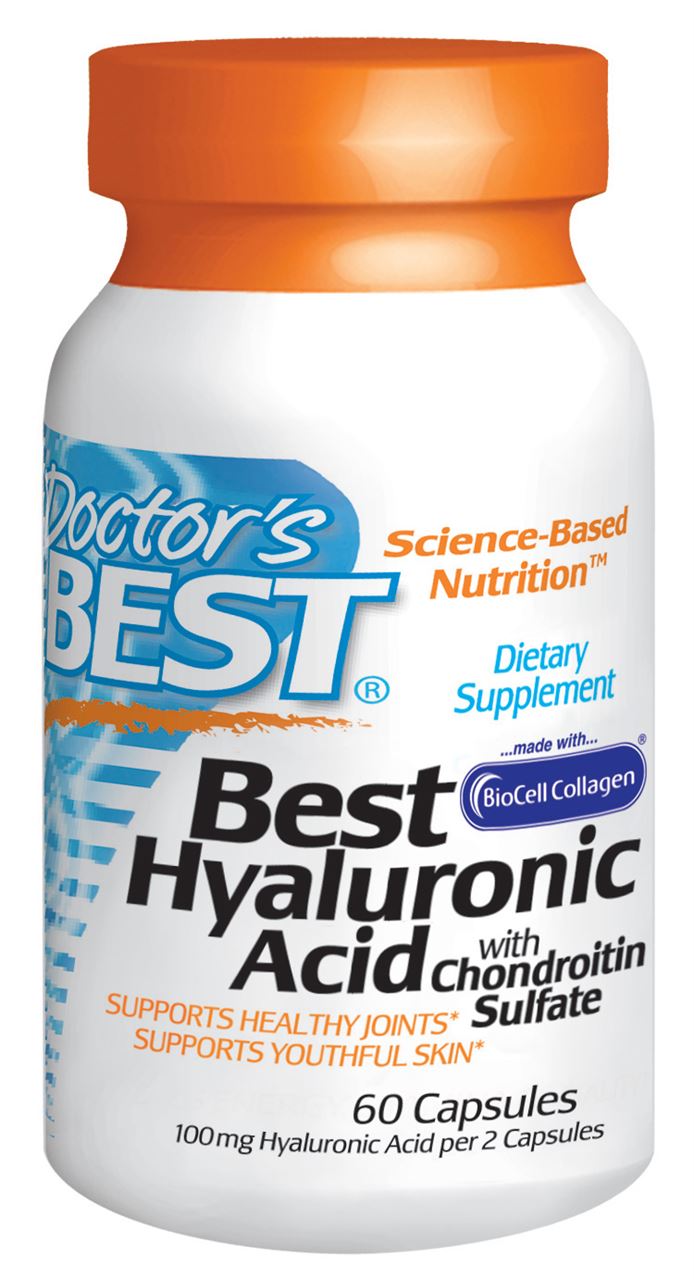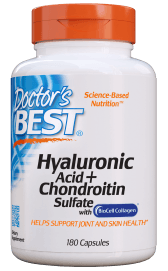FEATURES AND BENEFITS
- Science-based nutrition.
- Supports healthy joints.
- Supports youthful skin.
Doctor's Best Hyaluronic Acid wth Chondroitin Sulfate contains patented BioCell Collagen II®. BioCell Collagen II® is sourced from chicken sternal cartilage and provides bioavailable, low molecular weight hyaluronic acid. It is standardized to contain 10% Hyaluronic Acid, 20% Chondroitin Sulfate, and 60% Collagen Type II.
Hyaluronic Acid and Collagen are vital structural components of the skin that decline as we age, and are partly responsible for the skin's moisture, suppleness and elasticity. BioCell Collagen II® contains key components that can help support healthy skin and joint function.
BioCell Collagen® is hydrolyzed and denatured to low molecular weight compounds that increase the bioavailability and absorption of its components. In an absorption study of BioCell Collagen®, measurements revealed a gradual and significant increase of active total Hyaluronic Acid (HA) in the blood of test subjects after a single dose.1 In the same study, subjects taking BioCell Collagen® for 28 days maintained elevated blood levels of HA compared to initial levels.
The components of Doctor's Best Hyaluronic Acid with Chondroitin Sulfate are naturally found in human cartilage, and they have all been the topics of intense research in joint health over the past few decades. Collagen and hyaluronic acid are also vital structural components of skin that decline as we age, influencing our skin’s moisture, suppleness, and elasticity. BioCell Collagen® can help replenish the body’s natural supply of these components, which in turn can support healthy skin and joint function.
Ingredients
| Serving size: 2 capsules |
|
| Servings per container: 30 servings |
|
| BioCell Collagen,® providing: |
1000mg |
| Hyarulonic Acid |
100mg |
| Chondroitin Sulfate |
200mg |
| Hydrolyzed Collagen Type II |
600mg |
Other ingredients: Rice powder, gelatin (capsule), magnesium stearate (vegetable source).
Does NOT contain: milk, egg, wheat, gluten, corn, soy, sugar, sweeteners, starch, salt, or preservatives.
Non-GMO and gluten free.
Directions
Adults: Take 2 capsules daily, or as directed by a health care practitioner. Take with or without food.
Benefits
Hyaline Cartilage: Of Particular Interest As We Age
Acting as an efficient load-bearing surface for our freely movable synovial joints, articular (or hyaline) cartilage becomes a point of concern as we age: As a part of normal physiology, the tensile properties of this cartilage begin to decline after about age 30.2 Many factors come into play when considering healthy mechanical function of this invaluable tissue, not the least of which is structural composition.3 Hyaline cartilage is composed mainly of water, proteoglycans, and collagen (primarily Type II collagen). Attached to the protein core of proteoglycans are the glycosaminoglycans keratan sulphate and chondroitin sulfate, which have the important function of binding large amounts of water to work against cartilage compression. The proteoglycans can bind to a hyaluronic acid backbone to form larger molecules, adding to the solid portion of articular cartilage—essentially a dense network of type II collagen fibers embedded in a highly concentrated matrix of aggregate proteoglycan molecules.
Supports Healthy Joint Structure and Function
Components of BioCell Collagen® (collagen type II, chondroitin sulfate, and hyaluronic acid) can enhance the normal production of proteoglycans in the joint matrix, thereby enhancing healthy joint structure and helping to maintain joint shock absorption and cushioning. In a randomized, double-blind, placebo-controlled pilot study exploring the safety and effectiveness of BioCell Collagen® towards joint health, 16 subjects were enrolled to receive 2 grams of BioCell or placebo daily for 8 weeks.4 The subjects who were administered BioCell demonstrated significantly greater joint comfort, mobility, and quality of life over time, compared with placebo.
Collagen Type II
The benefits of collagen type II in safely supporting healthy joint and skin function have been examined in both animal and clinical studies.5 A randomized controlled trial conducted on 60 volunteers found that oral administration of chicken collagen type II for 3 months led to a significant increase in healthy joint structure, as compared to no measurable improvement in the placebo group.6 In another double-blind, placebo-controlled trial, 274 individuals were given collagen type II orally for 24 weeks. The supplement was shown to support healthy joint function, and no adverse effects were observed during this comprehensive clinical trial.7 Other studies have shown that hydrolyzed collagen provides a substantial advantage in bioavailability over non-hydrolyzed collagen, thereby having the potential to enhance healthy joint structure more efficiently.8
Chondroitin Sulfate
Chondroitin has been extensively researched for its ability to help maintain joint structure and function. In a review of high quality studies that included 1,443 research volunteers, long-term administration of oral chondroitin sulfate promoted knee comfort and overall motility, while also proving to be safe and well tolerated.9 On a biochemical level, chondroitin sulfate is believed to supply building blocks for proteoglycan synthesis and to hinder matrix metalloproteases (MMP) that are key proteases capable of degrading a range of matrix components in cartilage.10 Although the methods of action are not yet fully understood, the positive effects of chondroitin sulfate on the chondrocytes (cartilage cells), synovial membranes, and subchondrial bone of joints have been demonstrated in research. The immunomodulatory effects in articular cartilage, such as inhibiting activation of the transcription factor NF-kB, appear to be a primary action by which chondroitin enhances joint comfort.11
Hyaluronic Acid
Hyaluronic Acid (HA) is a type of building block called a glycosaminoglycan, and it plays an important role in supporting the structural strength of connective tissue and cartilage. Healthy connective tissue and cartilage maintenance is fundamental in normal skin and joint function. HA is highly concentrated in synovial fluid, where it serves to enhance joint lubrication and the elastic structural and functional characteristics of the joint. In 2007, a study with 98 participants determined that a healthy concentration of HA in synovial fluid is a strong indicator of joint health.12 Since the body’s supply of HA naturally decreases with age, Best Hyaluronic Acid with Chondroitin Sulfate has been formulated to help maintain healthy HA levels, allowing for the extended maintenance of joints and skin.
Helps Maintain Youthful Skin
HA also plays an important role in maintaining the health and natural beauty of the skin. The compound enhances the structure and volume of the skin by promoting healthy connective tissues that interact with the skin. HA plays a direct role in the attraction and maintenance of moisture in the skin; as HA concentrations naturally decrease in the elderly, it may become difficult for the skin to retain moisture, leaving the skin dry and uncomfortable.13 Researchers have performed comparative measurements of hyaluronic acid levels in the skin of young and elderly individuals. Results indicate that there is a normal and progressive reduction in the number of hyaluronic acid granules in human skin with age—so much of a reduction, in fact, that a complete absence of these granules was seen in healthy individuals 60 years or older. These variations in HA levels with age may account for the decreased turgidity, wrinkled appearance, and altered elasticity of skin tissue.14 Recent in-vitro laboratory studies are now indicating that HA not only provides moisture retention and structural support to the skin, but also promotes cellular vitality. The results of one such study indicate that HA given to human epidermal (skin) cells induces cell signaling that promotes natural cell repair and tissue renewal.15
Scientific References
- Judy, W., W. Stogsdill, and J. Judy, BioCell Technology. p. 1-22. Unpublished.
- Poole, A.R., et al., Ann Rheum Dis, 2002. 61 Suppl 2: p. ii78-81.
- Mansour, J., 2004, Lippincott Williams & Wilkins: Baltimore. p. 14.
- Pezzullo, J., et al., 2003, Georgetown University. p. 1-13. Unpublished.
- Schauss, A.G., et al., Food Chem Toxicol, 2007. 45(2): p. 315-21.
- Trentham, D.E., et al., Science, 1993. 261(5129): p. 1727-30.
- Barnett, M.L., et al., Arthritis Rheum, 1998. 41(2): p. 290-7.
- Moskowitz, R.W., Semin Arthritis Rheum, 2000. 30(2): p. 87-99.
- Uebelhart, D., Osteoarthritis Cartilage, 2008. 16 Suppl 3: p. S19-21.
- Monfort, J., et al., Ann Rheum Dis, 2008. 67(6): p. 735-40.
- du Souich, P., et al., J Cell Mol Med, 2009. 13(8A): p. 1451-63.
- Turan, Y., et al., Clin Rheumatol, 2007. 26(8): p. 1293-8.
- Beasley, K.L., M.A. Weiss, and R.A. Weiss, Facial Plast Surg, 2009. 25(2): p. 86-94.
- Ghersetich, I., et al., Int J Dermatol, 1994. 33(2): p. 119-22.
- Neuman, M.G., et al., Clin Biochem, 2010.


